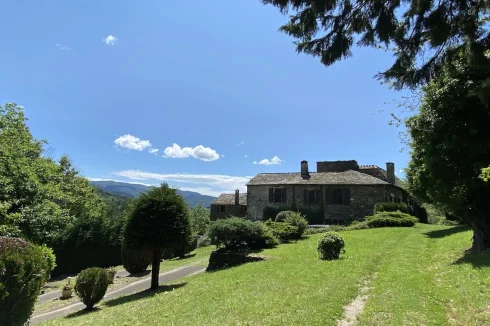Notaire Fees and Taxes Explained
Tuesday 04 October 2016
Most notaire fees are regulated on the basis of a fixed percentage rate or sum, but in other cases they are freely negotiable.
International property buyers will be aware of the central role of the French notaire in property conveyancing, although fewer people may recognise them as the de facto family legal advisor.
In addition to property conveyancing, notaires also act in inheritance procedures, marriage contracts, wills, divorce settlements, letting of property, business affairs, and gift procedures.
Notaires have a legal monopoly in the exercise of some of these responsibilities, but they are not salaried employees of the French government.
Instead, French notaires have a rather peculiar hybrid legal status; on the one hand a quasi-government official, and on the other, an independent legal advisor, although they are not entitled to undertake litigation in the courts. For that you will need an avocat.
Notaires earn their income entirely through the fees they charge for their services.
In most matters you will find that the fees charged are regulated by the government; some are modest, others many consider to be rather excessive.
These regulated fees are charged either on the basis of a percentage of the capital sum in the agreement, or simply as a fixed sum, irrespective of the value of the transaction (if any).
Fixed Percentage Charge
Those fees charged as a percentage of capital are called ‘émoluments proportionnels’.
There is no single percentage charge that is applied to all transactions, but rather two scales (called Séries S1 and S2) for different types of services and transaction values. These rates are digressive in relation to capital value. That is simple enough, except that for each type of service, the percentage rate is then multiplied by a coefficient, which varies according to the type of service being provided!
The most common scale in use is that for the sale and purchase of property. This scale is S1, with a coefficient of 1, which broadly equates to 1% of the value of the transaction.
Other percentage scale fees apply in relation to inheritance, mortgages, auction sales, and gift procedures between other persons. Depending on the amount of capital involved, the fees for such work can run into several thousand euros.
Fixed Sum
Where the work being carried out has no capital value, and in certain other limited cases where capital is involved, the fees are a fixed sum.
Examples of such services are a civil partnership agreement, a marriage contract (excluding transfer of assets) a tenancy agreement, a will, inventory, or power of attorney. The charges for such services should not exceed a few hundred euros, and should often be less.
In addition to the basic fixed fee, there are also other formalities that notaires often need to undertake, for which an additional fixed fee is payable. These fees are called ‘émoluments de formalité’. The sums are relatively minor, but should be itemised on the final statement.
Freely Negotiated Fees
Beyond these regulated services and their tariffs, notaires are also able to charge for other services, for which they are free to set their own charges.
These charges are called ‘honoraires libres’.
Services for which notaires can set their own charge include the formalities in relation to the sale of a business, landlord and tenant disputes, property valuation, or other specialist legal advice.
In the case of ‘specialist legal advice’ do not assume that an additional fee for advice given to you during the process of a regulated fee service is payable. The notaire is legally obliged to provide such advice at no additional cost.
Nevertheless, you may well find that as part of a service, the final fee charged is a mix of a percentage fee, fixed rate fee and a freely negotiated fee. Some regulated services contain both a percentage and fixed fee, eg gift between man and wife.
Whatever the type of fee, it will be subject to VAT at the rate of 19.6%.
If a notaire provides what they consider to be advice or assistance beyond that ordinarily required, and you are charged a freely negotiated fee, they are obliged to provide you with a written estimate of the cost of their services, or at least the means by which the fee will be determined, if a fixed fee cannot be offered at the outset. A notaire cannot simply surprise you with a demand for payment of their fees, without any prior written warning.
All of the charges will be detailed out on the final statement that must be provided to the client. However, getting to grips with interpreting it all is no easy task. If in doubt, do not be intimidated; ask for an explanation.
Whether a regulated or freely negotiated fee, a notaire is not entitled to take an advance of their fees, although they can take a small sum for disbursements.
In practice, in relation to house purchase, the fees are deposited with the notaire together with the proceeds for the purchase. As fees for house purchase are regulated, you should not have too much to worry about with this practice, although you would be advised to seek clarity about the estimated bill for fees (and taxes) at the time you sign the sale contract.
Fees for Property Purchase
The following table shows the notaire fees (frais de notaires) that are payable on the purchase of an existing property.
In reality, a significant part of what of the 'fees' actually comprises the conveyancing tax, or stamp duty, called taxe de publicité foncière. This tax is payable at the rate of 5.80% of the purchase price, although it is 0.715% on newly constructed properties. The tax is slightly lower than 5.80% in the departments of Indre, Isère and Morbihan.
The fees payable may vary slightly from those shown, depending on individual circumstances. Thus, the fees will be slightly higher if there is to be a mortgage on the property, or if the property is being purchased through a French property company, a Société Civile Immobilière.
If you require very particular specialised advice, the notaire is also able to make a charge, although this is not usual, and s/he is required to say in advance if any additional charge for such assistance will be payable, including the amount.
In total, taxes, fees and other charges combined, the percentage charge ranges from around 7% of purchase price at the top end to 10% at the cheapest end.
| Notaire Fees/Taxes on Property Purchase | |||
| Purchase Price | Stamp Duty | Notaire Fees/Costs | Total Cost |
| €60,000 | €3,900 | €2,130 | €6,030 |
| €90,000 | €5,730 | €2,380 | €8,110 |
| €120,000 | €7,550 | €2,620 | €10,170 |
| €150,000 | €9,370 | €2,870 | €12,240 |
| €230,000 | €14,220 | €3,520 | €17,740 |
| €300,000 | €18,470 | €4,090 | €22,560 |
| €380,000 | €23,330 | €4,780 | €28,110 |
| €450,000 | €27,580 | €5,310 | €32,890 |
| €600,000 | €37,010 | €6,530 | €43,540 |
| €750,000 | €45,780 | €7,750 | €53,530 |
| €900,000 | €54,890 | €8,970 | €63,860 |
| €1,000,000 | €60,960 | €9,780 | €70,740 |
Source: Chambre des Notaires, Ile de France
Disputes
Given the lack of transparency of notaires fees, it is sometimes difficult to establish whether or not you have been overcharged, either inadvertently or deliberately.
This is why it is so important to discuss the fees at the outset, so the potential for dispute is kept to a minimum.
You might also want to consider going to several notaires to obtain an estimate of their fee. Indeed, by doing so, you can also assess the quality of the advice you may be given.
If you receive a bill from a notaire with which you do not agree you should ask for an explanation. If you consider the response is not satisfactory you need to set out your complaint in a recorded delivery letter to the notaire.
In the event that you remain dissatisfied with their response then you should take the matter up with the disciplinary body of the notaires, called the Chambre des notaires. There is a Chambre in each department of France.
The President of the Chambre will examine your case and render his decision. Regrettably, there is a lot of evidence that the professional standards committee of notaires do not always act with the independence and rigour that may be required.
Accordingly, if you are dissatisfied with his decision you would need to take the matter to a court of law. Litigation between notaires and their clients is not uncommon, and a notaire does not always emerge victorious from it!
Next Article: Buying French Property by Auction
Thank you for showing an interest in our News section.
Our News section is no longer being published although our catalogue of articles remains in place.
If you found our News useful, please have a look at France Insider, our subscription based News service with in-depth analysis, or our authoritative Guides to France.
If you require advice and assistance with the purchase of French property and moving to France, then take a look at the France Insider Property Clinic.





